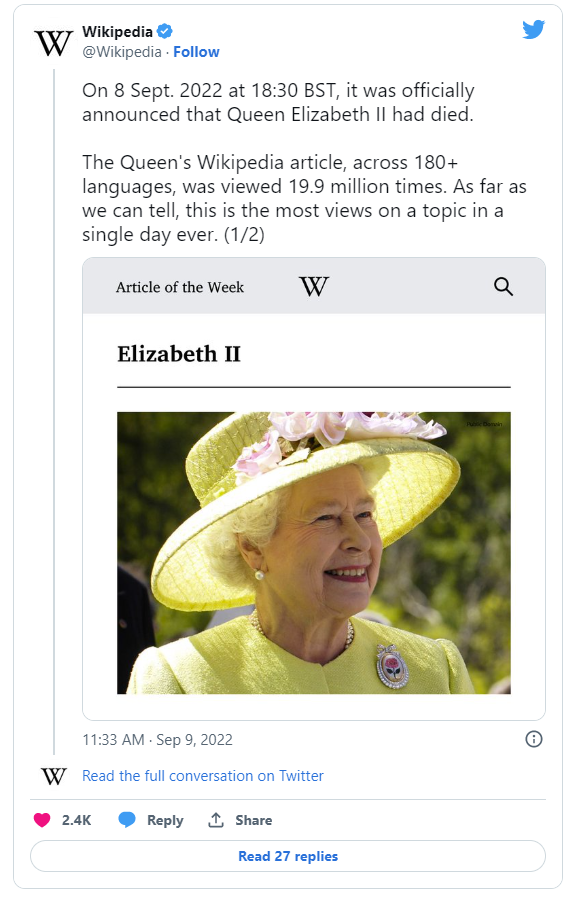It has been a long year dominated by news headline after news headline.
The Russian government invaded Ukraine. Queen Elizabeth II died. Amber Heard and Johnny Depp. The World Cup. Everything surrounding Elon Musk.
Wikipedia isn’t immune to that phenomenon. But in 2022, one particular English Wikipedia article captivated readers like you more than any other: Jeffrey Dahmer.
Even though this American serial killer’s last murder occurred more than two decades ago, interest in Dahmer surged after Netflix released Monster, a ten-part true crime anthology about his life. People visited Wikipedia nearly 55 million times to use us as a second screen to deepen their understanding of Dahmer’s horrific crimes.
Broadly, English Wikipedia’s most popular articles of 2022 can be categorized along the following lines:
- Popular media (such as Dahmer)
- Pop culture and current events
- War and death
Let’s dive in. (Or you can scroll down to see the list.)
. . .
Popular media and current events
Jeffrey Dahmer may be the headliner in this category, but he was far from the only reason you all came to Wikipedia.
In addition to getting plot spoilers, figuring out which actor is starring in your current binge, or getting some other background, using Wikipedia as a second screen for what you were watching was a strong theme across all of 2022.
People searched for Elvis Presley and Anna Sorokin ahead of seeing Elvis and Inventing Anna, or looked up House of the Dragon to remember what happened during the last episode. You can actually see the spikes in interest each week as HBO released new House of the Dragon episodes, along with a long tail of interest as people caught up later.At the theater, record-setting films Top Gun: Maverick and K.G.F: Chapter 2 were unsurprising entries this year. They appeared alongside The Batman and Doctor Strange in the Multiverse of Madness, highlighting our continuing pop culture fascination with superheroes.
Pop culture
For much of this year, Elon Musk has been a permanent fixture in many English-speaking media outlets.
Wikipedia saw this too.
People have come back to Wikipedia over and over to learn about the entrepreneur and business magnate, but never more than when he announced last April that he had entered into an agreement to purchase the social media network Twitter.
But what’s more popular than Musk? The FIFA World Cup! The fabled quadrennial sporting event between nations is occurring in Qatar this year amid a number of controversies. It previously appeared on this list during the last World Cup in 2018.
(Editor’s note: After this article was published, the Wikipedia article about Lionel Messi—the captain of Argentina’s World Cup-winning team—became the tenth most-viewed Wikipedia article of the year on the strength of over 11 million views in the month of December.)
English Wikipedia has two main articles on the World Cup—one for this year’s tournament, and another for its history since its creation in 1930—and the two have been read a combined 55 million times this year, a figure that will continue to rise until a winner is declared.

Last, attention to both Amber Heard and Johnny Depp was driven by their defamation trial going in front of a judge from April to June 2022.
War and death
For all the online discourse that fueled your interest in media and pop culture, this list of most-popular Wikipedia articles is also a somber reminder of conflict and lives lost.
Four of the articles on this list relate to the Russian government’s invasion of Ukraine, a war that has resulted in tens of thousands of deaths and Europe’s worst refugee crisis since the Second World War. Tens of millions of people came to Wikipedia to learn about the invasion that began in February 2022, the broader Russo-Ukrainian War that has gone on since 2014, the country of Ukraine, and Russian President Vladimir Putin. On average, we recorded over 325,000 views to those four articles each day in 2022.
This year also saw the death of Queen Elizabeth II, the longest-reigning woman monarch in history (that can be verified by historians). Elizabeth and the British monarchy have been appearing on these most-popular Wikipedia article lists for a while now, as was said in this round-up last year:
Queen Elizabeth has been a persistent fixture on these since 2016, the year that Netflix’s The Crown was released, and people’s enduring fascination with the House of Windsor was particularly apparent in 2017 when nearly a quarter of the list was devoted to royalty.

This year, the scale of interest in Elizabeth II after her death was unprecedented (as far as we can tell). In just 24 hours, we registered over 19.9 million hits to Wikipedia articles about her across about 200 languages, nearly 60% of which went to non-English languages.
If you stretch that to the full year, Wikipedia articles about Elizabeth II in all languages were read nearly one hundred million times in 2022.

Interest in the British Royal Family was not limited to Elizabeth alone. On English Wikipedia, people visited the article about Elizabeth’s son/successor Charles III over 25 million times—and lurking just outside the top 25 was Elizabeth’s father/predecessor George VI, with nearly 15 million visits.
Full list
- Jeffrey Dahmer, 54,931,777
- 2022 Russian invasion of Ukraine, 50,616,575
- 2022 FIFA World Cup, 46,794,250
- Deaths in 2022, 46,512,168*
- Elizabeth II, 43,566,103
- Elon Musk, 28,141,699
- Vladimir Putin, 25,808,228
- Charles III, 25,166,240
- Ukraine, 23,612,535
- Lionel Messi, 21,973,661
- Cristiano Ronaldo, 22,761,096
- Amber Heard, 20,397,536
- FIFA World Cup, 20,112,321
- Johnny Depp, 19,971,788
- United States, 18,850,486
- Russo-Ukrainian War, 18,822,302
- Andrew Tate, 17,641,062
- House of the Dragon, 17,625,922
- Top Gun: Maverick, 17,563,247
- Anna Sorokin, 17,066,155
- Doctor Strange in the Multiverse of Madness, 16,921,202
- Elvis Presley, 16,675,885
- RRR (film), 16,373,131
- K.G.F: Chapter 2, 16,368,401
- The Batman (film), 16,028,623
Notes
- This list was originally published with English Wikipedia data pulled by the Wikimedia Foundation on 12 December 2022. It was updated with pageviews from the last ~two weeks of the year in early January. All of the data includes pageviews that went directly to the articles and indirectly through any redirects. Finally, on 20 January 2023 we corrected the update to show that Messi received 11 million views through the entire month of December, not just in the final week of the World Cup.
- *The annual list of deaths is a perennially popular article on Wikipedia. To keep its length down, at the end of each month Wikipedia’s editors split the article into smaller month-by-month lists. As of publishing time, that covers December 2022—but if you’re reading it in January 2023, the page will be redirected to Wikipedia’s “Lists of deaths by year.”
- This list has been screened for false positives by cross-referencing the data against the percentage of mobile views and the percentage of articles without a referrer:
- Any articles with less than 10% or more than 95% mobile views have been removed, as that correlates strongly with spam, botnets, or other concerns. This affected articles like Cleopatra, which @depthsofwiki discovered is a default voice search on Google devices; Skathi (moon), for which we have no explanation yet; and more.
- Any articles where more than 50% of its pageviews came from no referrer were removed. This affected articles like Google and YouTube, and we found similar issues with other articles for large websites, even those that fell outside the top 25. We suspect that a significant number of these pageviews are mistakes that occur when viewers are trying to access those websites.
Previous most-popular Wikipedia articles by year data is available for 2021, 2020, 2019, 2018, 2017, 2016, and 2015.
. . .
Image credits from left to right: Jeffrey Dahmer via Revere Senior High School, public domain; Chernihiv Fortress Guns by Alex Arendar, CC BY-SA 4.0; Queen Elizabeth II via BiblioArchives / LibraryArchives from Canada, CC BY 2.0; World Cup Opening Ceremony by U.S. Department of State, public domain; Elon Musk by Debbie Rowe/The Royal Society, CC BY-SA 3.0. Image collage by Wikimedia Foundation, CC BY-SA 4.0.


